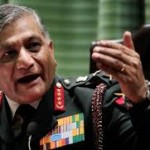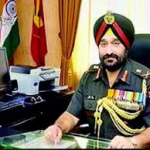क्या श्रीमती सोनिया गाँधी गोर्बाचेव की तरह भारत के टुकड़े टुकड़े कर के ही जाना चाहती हैं . कांग्रेस की यु पी ए – २ की सरकार ने देश को मंडी मैं तो बेच ही दिया अब यह इसे टुकड़े टुकड़े कर इसका अस्तित्व ही ख़तम कर देना चाहती है . पहले पोटा ख़त्म कर आतंकवादियों को सुरक्षा दी, फिर पुलिस को  मानवाधिकारों के नाम पर समाप्त किया . उसके बाद देश भक्त आई बी के अधिकारीयों को सी बी आई के चुंगुल मैं फंसा कर हमेशा के लिए ख़त्म कर दिया .
मानवाधिकारों के नाम पर समाप्त किया . उसके बाद देश भक्त आई बी के अधिकारीयों को सी बी आई के चुंगुल मैं फंसा कर हमेशा के लिए ख़त्म कर दिया .
अब अकेली बची सेना के साथ वाही होने वाला है. जनरल वी के सिंह की सर्व मानी आयु के सर्टिफिकेटों को नकार कर सेनाध्यक्ष से जाते जाते यह कहलवा लिया की सेना कश्मीर मैं AFPSA के बिना काम कर सकती है. अब उन्हें कहीं का गवर्नर बना देगी . सैनिकों की व् देश की सुरक्षा को काश्मीर की कुछ सीटों के लिए कुर्बान कर दिया जायेगा .
कौन कहता है की जयचंद और आम्भी इस देश अभी भी विद्यमान नहीं हैं .
please click on link to read
http://saisaonline.org/internal-security/dont-revoke-afspa-in-kashmir-as-yet/
Don’t Revoke AFSPA in Kashmir as Yet
Chief Minister Omar Abdullah has announced partial removal of AFSPA from J & K without consulting his commanders in the Unified Headquarters on Thursday. On the face of it the relative peace brought about by relentless efforts by the security forces in Kashmir give him the latitude to make this politically rewarding announcement. To a layman this makes sense since the valley has remained calm this year against three preceding years.
To the men in uniform, ably led by General Ata Hasnain, this sounds premature. Premature because all their hard work to prevent infiltration, neutralise militants in the hinterland and shift towards people friendly operations can be laid to waste if such voids are allowed in the militant infested landscape of J & K. Counter-insurgency operations call for leadership, commitment and courage to undertake relentless action amongst people. Without AFSPA, officers will stop taking initiative to attack terrorist hideouts. If the nation is to be protected, we need legislation to protect those whom we field to shield our people.
The authority conferred on the armed forces to search premises without a search warrant is an example. Understanding of insurgency operations is a must to perceive the act’s relevance. The insurgent is essentially fleet-footed and changes his location continuously. Forces act on intelligence and can only nab the terrorists by moving swiftly and stealthily. Should the armed forces await a court order, they will never be on time. As the troops close in around a building being used as a shelter or hideout, they inevitably come under fire. The AFSPA authorises them to destroy such shelters, training camps etc. It should not need much explanation to understand that there is no other way of neutralising the insurgent.
The situation in insurgency affected states has largely been brought under control by the army by a series of CI Operations aimed at flushing militants out of the jungles and villages, by clearing the roads daily and dominating the Line of Control 24 x 7 round the year. These collossal efforts and hardships of the army go unsung in a scenario of peace where the nation takes these as given. When there are nearly two army commands deployed to provide these functions across eight states of the country, there will be cases of judgmental errors and high handedness, specially when there are troop casualties. These collateral damages are far less than the US records in Iraq, Afghanistan or Vietnam and Pakistan and Sri Lanka’s in their respective countries.
One incident free summer, brought about through the dint of perceptive leadership and hard work of the troops can not be construed as a licence to dilute AFSPA and enable the militants and their Pakistani handlers from intensifying their operations amongst people. If implemented, it would severely marginalise our counter insurgency efforts and force us to contain the militancy with our hands tied behind our backs.
The message is loud and clear – Don’t revoke AFSPA in Kashmir as yet,whatever the compulsions.

